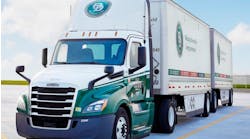In a move that will impact tens of thousands of owner-operators in California, the U.S. 9th Circuit upheld the state’s Assembly Bill 5’s ABC test for classifying truckers as either employees or independent contractors, overturning a previously granted injunction. The ruling was 2-1.
The International Brotherhood of Teamsters served as the intervenor-defendant.
The injunction was filed by the California Trucking Association, arguing the ABC test used to define who is a gig worker, was contrary to the precedent set by the Federal Aviation Administration Authorization Act of 1994 (F4A).
“AB 5 threatens the livelihood of more than 70,000 independent truckers,” said CTA ‘s CEO Shawn Yadon in 2019, when the CTA and two owner-operators filed for the injunction. “The bill wrongfully restricts their ability to provide services as owner-operators and, therefore, runs afoul of federal law.”
In the opinion written by 9th Circuit Judge Sandra Ikuta, the court found: “Because AB-5 is a generally applicable labor law that affects a motor carrier’s relationship with its workforce and does not bind, compel, or otherwise freeze into place the prices, routes, or services of motor carriers, we conclude that it is not preempted by the F4A.”
With the ruling, the ABC test is back in play. According to the test, a trucker, or any gig worker in the Golden State, will be defined as an independent contractor if they meet the following:
A. The person is free from the control and direction of the hiring entity in connection with the performance of the work, both under the contract for the performance of the work and in fact.
B. The person performs work that is outside the usual course of the hiring entity’s business.
C. The person is customarily engaged in an independently established trade, occupation, or business of the same nature as that involved in the work performed.
In his dissent, Judge Mark J. Bennett, wrote: “CTA’s members will now suffer irreparable injury. And the damage to the policies mandated by Congress will likely be profound.”
Judge Bennett also noted in his dissent the argument made by CTA officer Greg Stefflre on behalf of the trucking industry that keys in on how owner-operators oftentimes have “unique and specialized equipment” that a fleet would not utilize enough to justify the expense.
“Therefore, an owner-operator fleet by definition consists of a variety of specialists who can bring on their specialized equipment as needed and, when the need abates, the owner-operator can move to another motor carrier where the equipment is needed,” noted Stefflre. “In contrast, employee fleets cannot keep infrequently used, specialized equipment on hand because of the capital costs associated with acquiring this equipment. As a result, employee-based motor carriers will be unable to offer services requiring such equipment—services currently available through owner-operator-based motor carriers.”
This, Stefflre claimed, would “deprive motor carriers’ consumers of particular services — consumers who depend on motor carriers to hire independent contractors to transport unwieldy, hazardous, or otherwise unusual goods that could not be transported with typical trucks and equipment.
Furthermore, this could vastly change fleet flexibility in California, Stefflre argued:
"The use of owner-operators permits expansion in times of plenty and contraction during shortages in business. Employee driver fleets cannot expand and contract as easily and certainly not as inexpensively as independent contractor fleets. To use employee drivers, one needs to acquire trucks. Even if leased, such leases require fixed terms when establishing price so the size of the fleet cannot be lowered without incurring penalties. In owned fleets, the unused tractors become a completely non-productive asset and a drain on profitability. Owner-operator fleets can relatively easily expand and contract. When existing business goes to a competitor, the owner-operators working with the incumbent simply move to the successful bidder eliminating the drain that would occur with an employee fleet.”




